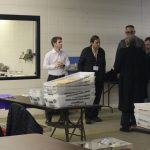A closer look at buzzworthy documentary “As Goes Janesville”
Michael Horne takes a closer look at the documentary "As Goes Janesville" at an advance screening and fundraising event for the film at Discovery World.

Filmmaker Brad Lichtenstein addresses the sneak preview audience at Discovery World on May 16, 2012. (Photo: Spencer Chumbley)
“I’m a small “D” democrat,” Milwaukee filmmaker Brad Lichtenstein said to a group who had gone to Discovery World on earlier this month to see excerpts of his new documentary, As Goes Janesville.
Prior to this event, an excerpt from the film received worldwide attention. In it, Gov. Scott Walker tells Beloit billionaire Diane Hendricks about his “divide and conquer” approach toward public unions. In the scene, she asked Walker what it would take to make Wisconsin a “Red State,” with a “right-to-work law.”
Some of the big “D” Democrats wanted to know why Lichtenstein didn’t focus his film on activists opposing Walker’s “reforms.”
“I chose non-activists,” Lichtenstein explained, “to see people become politicized makes it interesting.”
He clarifies: “I wanted to find multiple points of view; multiple people that people can recognize as themselves…I didn’t want to do Wall Street, foreclosures, banks. I wanted to get under the story, in homes, in business groups.”
“Usually in documentaries we cut out rallies and meetings because they are boring. Here, we included them,” Lichtenstein remarked during live sessions interspersed with nine clips from the upcoming documentary.
In the end, he said, viewers can see that there is “unequal access to policy and business leaders.”

Managing producer of 371 Productions Nicole Docta and its president filmmaker Brad Lichtenstein on the scene. (Photos courtesy 371 Productions website and facebook page)
Lichtenstein began filming the documentary in March 2009. It follows the lives of three factory workers in Janesville – two from GM and another from Alcoa, a longtime supplier of engine castings. In a counterpoint, Lichtenstein followed a local banker and a local businessman, Tim Cullen, who had once represented the area in the legislature as a Democrat, and who was to run for the state senate, successfully, during the filming. He later would become one of the Wisconsin 14, who famously fled the state to thwart legislative action on Gov. Walker’s budget.
Lichtenstein’s camera followed Laura Deegan, then 41, who was training for a medical technology certificate to replace her job at Alcoa, which she had held for 20 years.
“I never thought I would be doing this,” she says, working on a school assignment while contending with household chores, raising her children and feeding her pets.
“My 6th grade daughter had the same homework as I did. And she told me, ‘don’t go out until your homework’s done.’ ”
Another woman, accustomed to earning $28 per hour with benefits, was dismayed at the offerings at the job center, where most positions went for minimum wage. “Why it would take four jobs just to make a living?” she lamented.
On the other side of the class divide, a woman banker met with Chamber of Commerce fellows who were working to rebrand Janesville. This was new to them, since in the past all the chamber had to do was stamp a “GM” logo on its I.D.
Now, it had to work hard to find a new employer – or new employers – to fill the void left by the plant’s closure.
Cullen, by then back in the legislature, sits through the meetings, somewhat wary that much good would come of his presence, while there is such a great divide in the community.
He stands by as Governor Walker and members of his administration are shouted down by an angry assembly at an event, and is lambasted when he asks the group to give the governor a chance to say his words in peace.
In another scene, the annual Janesville business dinner provides a clear example of the schism as hundreds of protesters gather outside the convention hall to protest the Governor’s arrival, while within, all is civil, calm – and insulated by abundant security.
But the workers are not feeling particularly secure. One takes up General Motor’s offer to transfer to an out-of-state plant, leaving her husband to take care of the children during her absences. Another finds that her 18-year old son was involved in a horrific car crash back home, where she can’t wait to be.
THE EVENT
The Discovery World event, billed as a fundraiser for the film, was arranged by Nation Consulting, a local firm with ties to the Democratic Party and possible aspirations to Hollywood. The event had elements of a political fundraiser and a motion picture gala.
Jason Rae, who was the youngest delegate to the 2008 Democratic National Convention is a Nation employee and was among those at the event, as was host Sachin Chheda, a fellow worker and chair of the Democratic Party of Milwaukee County.
The connection was via Lichtenstein’s and Chheda’s young sons, who are friends and neighbors.
Chheda, working without a script, introduced the evening’s events, rattling off the film’s extensive list of sponsors including the Mac Arthur Foundation, PBS, the Lubar, Mary Nohl and Brico Foundations along with Stacy Herzing.
He also recognized the attendees for their financial support.
Lichtenstein said the film is in its final editing stages, and that he and the crew are so familiar with the characters and the hundreds of hours of footage that they sometimes edit by quoting the characters and mimicking their voices.
 The film will be aired on PBS later this year — “Sometime in late October or early November.” One might imagine the date will indeed be some time before the first Tuesday in November.
The film will be aired on PBS later this year — “Sometime in late October or early November.” One might imagine the date will indeed be some time before the first Tuesday in November.
The reception, catered by Bartolotta Group, featured crudites, tenderloin and tomato brie sandwiches, aparagus and a nice cheese plate with waiters passing plates of hot goods including grilled chicken on a stick. Definitely Hollywood.
Among the attendees were union official Stephanie Bloomingdale, education activist Barbara Miner, Larry Miller and Meghan Hollman of the Milwaukee School Board, and newly elected county supervisor Deanna Alexander. They were joined by Milwaukee Alderman Nik Kovac, who rode to the screening on his bicycle, and Sen. Chris Larson, who took the bus from Bay View, covering the distance from the nearest stop on N. Water Street on foot.
Movies
-
Milwaukee Film Festival Returns in April
 Mar 27th, 2024 by Sophie Bolich
Mar 27th, 2024 by Sophie Bolich
-
Nina Simone’s Summer of Soul
 Nov 29th, 2022 by John Sieger
Nov 29th, 2022 by John Sieger
-
The Surprise Pick for Best Picture
 Mar 22nd, 2022 by Dominique Paul Noth
Mar 22nd, 2022 by Dominique Paul Noth















